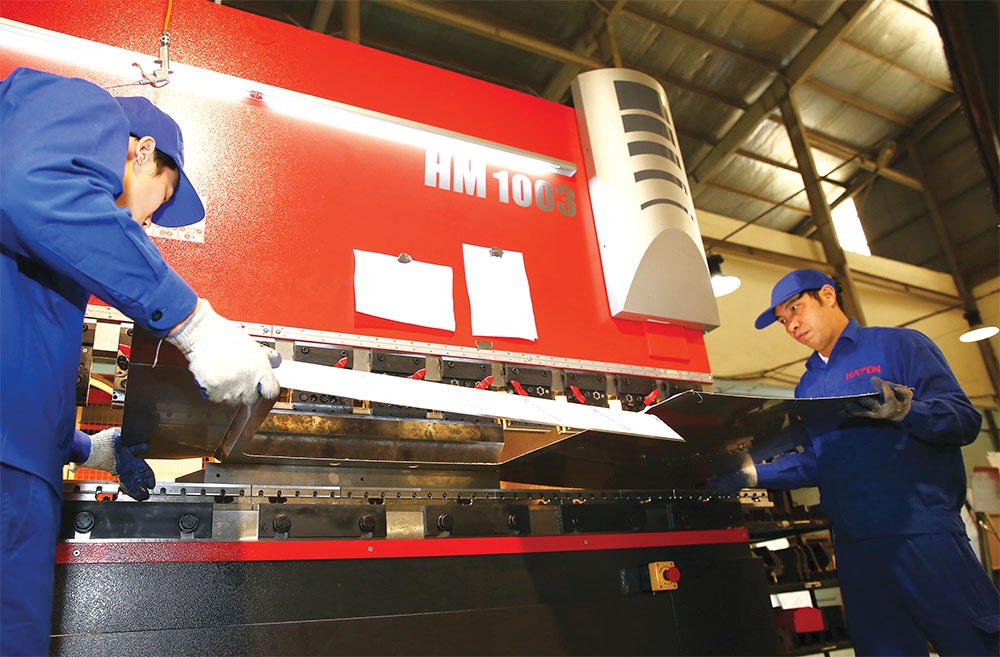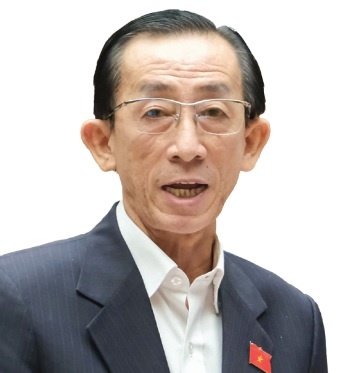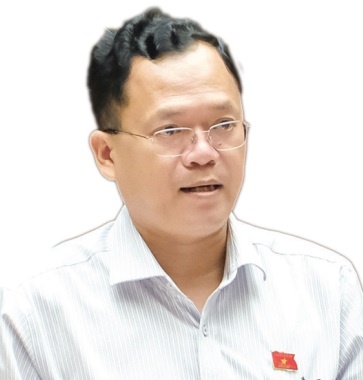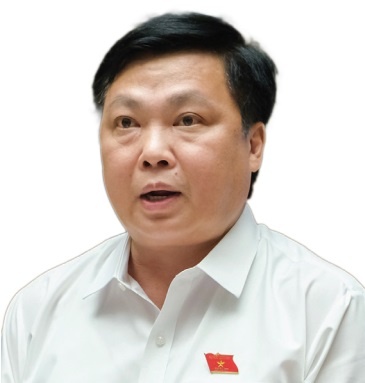Business rejuvenation still dependent on PSRD thrust
Back in May at the third session of the 15th National Assembly, Vu Hong Thanh, Chairman of the National Assembly Economic Committee (NAEC), said the deployment of the country’s Programme on Socioeconomic Recovery and Development for 2022-2023 (PSRD) had been implemented at a very slow pace.
“All national target programmes and tasks to implement the fiscal and monetary policy in service of the PSRD are being deployed slowly, with important policies being just in the stage of drafting guidance and have yet to be put in practice, such as the lending rate support policies for enterprises, and the large-scale programme on providing computers for pupils, among many others,” Thanh said.
Now, at the ongoing fourth session of the 15th NA, Chairman Thanh has seen some improvements in the implementation of the PSRD, but still frowns as sluggish implementation.
“Though the government has drastically made efforts to push it forward, results remain humble. As of late August, two out of 17 documents used to concretise policies have yet to be enacted. These two important documents are from the ministries of finance and information and communications,” Thanh said. “The implementation of assistance policies under the PSRD is facing some tough conditions, making it difficult for enterprises to access and benefit from the policies. Meanwhile, administrative procedures remain complicated, with unclear conditions for benefiting from policies that are reducing their effectiveness.”
In January, the government launched the PSRD under Resolution No.11/NQ-CP, and the NA promulgated Resolution No.43/2022/QH15 on a fiscal and monetary policy worth $15 billion or about 4.5 per cent of GDP last year to support the programme.
 |
| The PSRD package came about as businesses across industries struggled with pandemic restrictions, photo Le Toan |
Slowed performance
The PSRD, the first of its kind in Vietnam, came amid businesses and people suffering from massive woes caused by COVID-19. From a macro-view, it is expected to enable the economy to achieve a higher level of growth – at 6.5-7 per cent in the 2021-2025 period.
The programme covers five key components: re-opening the economy pertaining to enhancing medical capacity, and pandemic prevention and control ($2.6 billion); ensuring social welfare and employment ($2.31 billion); assisting recovery of enterprises, cooperatives, and business households ($4.78 billion); developing infrastructure ($4.95 billion); and increasing institutional and administrative reform as well as improving the investment climate. Moreover, another $434.8 million will be mobilised from non-state budget financial funds.
Under the PSRD, VAT for applicable goods and services has been reduced to 8 per cent, excluding that for goods and services in the sectors of telecommunications, IT, finance and banking, insurance, stocks, real estate, metal production and mining (except coal), coke production, petroleum, chemicals, and commodities and services that are subject to special consumption tax.
As of late September, Vietnam exempted VND39.42 trillion ($1.71 billion) as VAT and environmental protection tax for aircraft fuel. A sum of over VND97.9 trillion ($4.25 billion) worth of extension of payment of assorted land taxes and rental was offered.
However, according to the NAEC, the rate of disbursement of the policies under the far-reaching programme is at a relatively low rate of 20 per cent or VND61 trillion ($2.65 billion) of the programme’s total capital, as of late September. Moreover, disbursement of the infrastructure development package has also been slow – specifically, it was not until late August that the government submitted to the National Assembly Standing Committee a report on the investment portfolio and capital quotas for projects and tasks within the PSRD.
In another case, the 2 per cent lending rate support package within the programme via the commercial bank system has seen a very low disbursement rate – at only about $13.5 billion (nearly $587,000) out of VND16 trillion ($697 million) allocated to 2022. The total value of this package is VND40 trillion ($1.74 billion) for 2022-2023.
“The government needs to clarify the reasons behind such a low disbursement rate. Currently, it is widely said that this 2 per cent lending rate support package will become useless as commercial banks have been increasing their lending rates, and also that the use of VND1 trillion ($43.5 million) for the programme on providing computers for pupils may not be suitable to this existing situation,” said Thanh of the NAEC.
Thus, it is recommended that there must be more specific assessments on the results and implementation situation of Resolution 43 under each concrete policy, he continued. “This includes the usage of the fund for scientific and technological development for enterprises and the increase in the charter capital of state-owned commercial banks and commercial banks whose 50 per cent stake is owned by the state. It is also necessary to clarify limitations and hurdles, with solutions proposed in line with the existing situation.”
“There are opinions that things have changed from when Resolution 43 was formulated and enacted, so it is also necessary to revise some policies within the PSRD during implementation.”
Addressing the NA, Prime Minister Pham Minh Chinh also admitted, “Disbursement of public investment and implementation of some policies within the PSRD and of three national target programmes, as well as making new plans, remain slow.”
Further assistance
Many NA deputies said that if the programme’s implementation fails to be quickened, more and more enterprises will face difficulties as they are waiting for additional support from the government.
“Initially it was forecasted that economic growth for 2022 would be about 6-6.5 per cent. However, the rate reached 13.67 per cent in the third quarter. This result reflects Resolution 43 has proved quite to be effective as it was expected earlier to create an additional 1.5-2 per cent in economic growth,” said NA deputy Nguyen Quang Huan, representing the southern province of Binh Duong.
“However, production and business activities of enterprises and people are in general bogged down in difficulties. Disruption of many supply chains has yet to recover, while prices of input materials, especially the fuel prices are increasing,” Huan stressed. “Some policies within the PSRD remain slow in implementation, such as the 2 per cent lending rate support package which is now longed for by many enterprises.”
NA deputy La Thanh Tan, representing the northern port city of Haiphong, also noted that now is a good time for enterprises to boost recovery as the pandemic has abated, but they need extra assistance from the state.
“The PSRD must be deployed in a more rapid manner. Enterprises are in critical need of support in debt restructuring, and extension, delay, reduction, and exemption of tax and fee payment,” Tan said.
Figures from the General Statistics Office showed that in the first nine months of 2022, the number of enterprises that withdrew from the market hit nearly 112,700, up 24.8 per cent on-year.
A government report sent to the NA stated that domestic enterprises, the vast majority of which are small or medium-sized and with low competitiveness, have been greatly vulnerable to the pandemic effects as well as the prolonged Russia-Ukraine conflict.
“Risks on continued disruptions in supply chains and hikes in prices of imported input materials for productions have and will continue to put great pressure on businesses’ production and business activities,” read the report. “The purchasing power in the domestic market has been recovered but consumption is now largely focused on indispensable goods. The implementation of demand stimulus solutions remains difficult – the incomes of the public have reduced, and many businesses are still encountering difficulties in recovery.”
| Tran Hoang Ngan-National Assembly deputy Ho Chi Minh City
There has been high economic growth, with macroeconomic stability, strengthened institutional construction, ensured major balances of the economy, continued trade balance, a trade surplus, as well a sound performance in terms of public debt, government debt, and guaranteed foreign debt. Moreover, defence and security have been strengthened, and independence and sovereignty maintained, contributing to enhancing the prestige and position of our country in the international arena. However, the government’s report also acknowledges many challenges. Firstly, the restructuring, arrangement, and renewal of state-owned enterprises (SOEs) and public non-business units have not met requirements. In my opinion, it is necessary to promote the strong restructuring of groups, corporations, and SOEs; and handle inefficient enterprises, and promote the role of SOEs in major national projects, especially investment in key industries, the materials industry, metallurgical industry, and mechanical engineering. Secondly, production and business activities in some industries still face many difficulties in capital, exchange rate, labour, taxes, and fees. When implementing fiscal and monetary policy worth $15 billion to support Vietnam’s Programme on Socioeconomic Recovery and Development (PSRD)for 2022-2023, there are many favourable implementation packages but also unfavourable ones. Specifically, in the lending rate support package for businesses, cooperatives, and business households so far, we have only disbursed VND12.8 billion ($556,500) compared to the plan of VND40 trillion ($1.74 billion), reaching only 0.03 per cent of the plan for several reasons. However, for the support package for tax exemption, reduction, and extension, we deployed efforts more smoothly and, so far, achieved 72.5 per cent of the plan. I propose the National Assembly (NA) and the government consider transferring undisbursed interest rate support to tax and fee exemption and reduction, extending the time for paying land rent tax for businesses. In the current difficult situation, doing so will help many businesses, cooperatives and households. Nguyen Huu Thong-National Assembly deputy Binh Thuan province
This time one year ago, the NA met, discussed, and evaluated the results of the socioeconomic development plan in 2021 and the proposed version for 2022. At that time, the country had yet to effectively control the pandemic while facing many other difficulties. Many NA deputies then wondered how to implement the government’s submitted development plan, with an expected growth rate of 6 to 6.5 per cent. However, great progress was made thanks to the timely direction of the Party Central Committee, the Politburo, the Party Secretariat, Party General Secretary Nguyen Phu Trong, the NA, and agencies in all sectors and localities, the socioeconomic situation in the first nine months of 2022 has recovered and achieved important results. The whole year is expected to achieve 14 out of 15 planned targets with an expected economic growth rate of 8 per cent. Vietnam is one of the few countries in the world that is appreciated by prestigious international organisations for its coronavirus prevention and control and economic recovery. However, some people, especially farmers and fishermen, have faced difficulties. Though they have received much support from the state, but they have not escaped poverty and difficulties. With high fuel prices, large fluctuations in input materials, unstable agricultural markets, and no increase in prices, these woes are becoming bigger. The stock market, corporate bonds, and real estate still have many potential risks, while the structure of some credit institutions remains weak. After the authorities punished some businesses in these fields, some people and businesses have felt insecure and depressed because they have invested in these areas. Nguyen Dai Thang-National Assembly deputy Hung Yen province
To effectively implement the socioeconomic development plan in the last months of 2022 and that of 2023, it is recommended that the government continue to have more effective solutions to boost the disbursement of public investment capital, speed up progress, and ensure the quality of key national key projects. Disbursement of public investment is a bottleneck that has not been effectively resolved. By the end of September this year, it only reached 46.7 per cent, and official development assistance capital only hit 15 per cent. The main reason for the slow disbursement is the lack of completed volume as a basis for disbursement. There has been a delay in project implementation, in deployment of procedures for adjusting investment policies, and in the adjustment of loan agreements and projects, as well as hurdles in payment. In addition, there are several other reasons, such as failure in allocating all the assigned capital plan, and delay in receiving the donor’s comments. Therefore, it is proposed that the government continue to take drastic solutions to direct ministries, sectors, and localities to promote the completed volume for disbursement. Ministries, sectors, and localities shall inspect, review, supervise, urge, and promptly remove obstacles in project implementation and disbursement. They also have to promote disbursement of projects that have completed investment procedures, bidding, and contract approval. For cases where it is impossible to complete the project volume according to schedule, it is necessary to cut or transfer the assigned capital plan. Projects that need to adapt should promptly adjust investment policies to soon change the disbursement time, capital adjustment, and allocation. Additionally, owners and project management units are responsible for expeditiously completing procedures for construction investment, compensation, support, resettlement, speeding up site clearance, and expeditiously completing the payment dossier and sending it to the State Treasury for expenditure control. Next, it is recommended that the government evaluate more specifically the results of the implementation of the PSRD. Up to now, the disbursement rate under the PSRD is still low, reaching 20 per cent by the end of September, while the 2 per cent lending rate support package through the commercial banking system also has a very low disbursement rate. It is suggested that the government soon have solutions to speed up the disbursement of this support package. At the same time, it is recommended to implement the PSRD, accelerate activities to support businesses, diversify the supply of input materials and accessories, and diversify export markets to avoid dependence on certain markets. Huynh Thanh Phuong-National Assembly deputy Tay Ninh province
In 2022 so far, COVID-19 has been repelled nationwide. The macro-economy is stable, creating conditions to promote socioeconomic growth. The consumer price index (CPI) and exchange rate are controlled according to the set target; foreign investment capital and development investment have increased with better quality. Exports have risen rapidly, with the trade surplus reaching a higher level than in the same period for many years. Jobs, people’s lives and workers’ lives have gradually improved as compared to the pre-pandemic period. Moreover, digital transformation has made many important achievements. The processing and manufacturing industry has made a new breakthrough. Services are restored and developed, contributing to GDP at a high rate. Although there are still many difficulties, the fields of education, training, and health still achieve results. Independence, sovereignty, and territorial integrity are firmly protected, with foreign affairs being constantly expanded and promoted, contributing to world peace, cooperation, and development. However, shortcomings remain. The implementation of the support package for socioeconomic development recovery is still slow, especially for housing rental support and job loss support during the lockdown period. Many regulations and procedures are cumbersome, making it hard for people to enjoy the support packages while the number of people needing them is large. Disbursement of public investment capital is a bottleneck that has not been overcome for years. It is likely that it will not reach the target set by the NA, although, from the beginning of the year, the government has directed this strongly. This shows public investment discipline is not strict enough. Moreover, the CPI annually climbs by about 4 per cent, causing real wages and living standards to decrease. This has led to a shift of highly skilled, professional workers, cadres, and civil servants from the public to the private sector in recent times, which keeps rising. Pham Hung Thang-National Assembly deputy Ha Nam province
In 2023, it is forecasted that there will be many difficulties and great challenges. I suggest that the government, ministries, and sectors pay more attention to dealing with some issues. Firstly, it is necessary to proactively respond to inflation scenarios that are increasing globally and have directly affected the economy and life of our country. It is also needed to report to the NA to proactively apply appropriate policies and respond to the risk of inflation, input prices and signs of the money and financial markets that have really had a strong impact on production and business activities, and social life. Secondly, it must be more flexible and timely in disclosing information on interest rate and exchange rate operating scenarios so that the business community is not passive in preparing production and business plans, creating favourable conditions for businesses to have more favourable access to capital, especially credit concessional capital in the context of recovery. It is also needed to make better forecasts on financial, monetary and labour markets so that people and businesses can have proactive adaptation. Thirdly, it is necessary to review, amend, and supplement mechanisms and policies to remove difficulties, speed up the disbursement of public investment capital, and reduce the transfer of state budget capital from the previous year to the next year. |
What the stars mean:
★ Poor ★ ★ Promising ★★★ Good ★★★★ Very good ★★★★★ Exceptional
Related Contents
Latest News
More News
- Masan Consumer names new deputy CEO to drive foods and beverages growth (February 23, 2026 | 20:52)
- Myriad risks ahead, but ones Vietnam can confront (February 20, 2026 | 15:02)
- Vietnam making the leap into AI and semiconductors (February 20, 2026 | 09:37)
- Funding must be activated for semiconductor success (February 20, 2026 | 09:20)
- Resilience as new benchmark for smarter infrastructure (February 19, 2026 | 20:35)
- A golden time to shine within ASEAN (February 19, 2026 | 20:22)
- Vietnam’s pivotal year for advancing sustainability (February 19, 2026 | 08:44)
- Strengthening the core role of industry and trade (February 19, 2026 | 08:35)
- Future orientations for healthcare improvements (February 19, 2026 | 08:29)
- Infrastructure orientations suitable for a new chapter (February 19, 2026 | 08:15)






 Tag:
Tag:



















 Mobile Version
Mobile Version